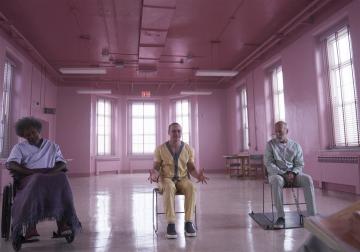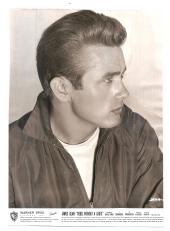James McAvoy's 24 personalities almost — but not quite — rescue 'Glass'
Kevin Wendell Crumb’s 24 distinct personalities are enough to keep everybody on the mental health staff busy. He’s the equivalent of two deranged football teams, or six psychopathic bridge tables.
When last seen, two years ago in director M. Night Shyamalan’s “Split,” Kevin (James McAvoy) kidnapped three nubile high school girls — no point kidnapping high school girls unless they’re nubile — and sadistically toyed with them in his labyrinthine underground bunker.
Or rather, Hedwig, Dennis, Orwell, Jade, Patricia, Heinrich, et al., toyed with them. It’s hard to keep up with two dozen personalities. They tag-team in a split second. But most dangerous is the uber-powerful one who pops out when Kevin is most stressed: the Beast.
If you thought the Beast was dispatched at the end of “Split,” your naivete exceeds Pollyanna’s. In “Glass,” the follow-up at hand, he’s alive and well at Raven Hill Psychiatric Hospital under the care of Dr. Ellie Staple (Sarah Paulson). Also alive, if not so well, is a gaggle of nubile cheerleaders chained up inside a nearby warehouse.
- Starring: James McAvoy, Bruce Willis, Samuel L. Jackson.
- Rating: PG-13 for violence including some bloody images, thematic elements and language.
Now, Dr. Staple has a remote-control device not unlike your FiOS one that changes Kevin’s personality channel by zapping him with klieg lights when he gets out of hand. Trouble is, (No. 1) you never know which of his channels you’ll get next, and (No. 2) nubile cheerleaders — like this screenplay — are none too resourceful in a crisis.
Sounds like a job for vigilante security guard-psychic David Dunn, who you’ll recall is — or maybe you won’t recall…
There should be a law requiring all prequels, sequels, trilogies, quadrupies, etc. to stand alone in terms of plot. But since there isn’t, I’m obliged to tell you that ages ago in “Unbreakable” (2000), David (Bruce Willis) was the sole survivor of a terrible train collision. A mysterious stranger named Elijah (Samuel L. Jackson) tells him he’s one of a small superheroic subset of people endowed with extraordinary endurance, courage, a predilection for danger and premonitions of criminal events.
Got all that? It’s actually TLI, not TMI — too little, not too much information — just the minimum necessary to prep you for “Glass,” in which all three of the above-named principles find themselves confined in the same loony bin.
Kevin was originally created for “Unbreakable” but pulled and put in narrative mothballs until “Split” (2016). “Glass” now completes the tortured trilogy. Disney owns “Unbreakable.” Universal owns “Split.” They agreed to team for the unique idea of a sequel to both — first co-production between two bitter rivals in the film and theme park businesses for half a century.
Money heals all wounds, physical and corporate.
The superhero theme in “Glass” is said to have been partly inspired by the gothic sendup comic, “Forbidden Brides of the Faceless Slaves in the Secret House of the Night of Dread Desire.” But you’ll need a Geiger counter to detect the humor here.
Production values, on the other hand, are plentiful, as we’ve come to expect from Mr. Shyamalan. Filming took place at an atmospheric (former) mental hospital in Allentown, Pa. Philadelphia provided gritty backgrounds and a subplot about the grand opening of a new building that makes no sense whatsoever.
Mr. McAvoy has a field day, slipping easily from one persona to another with a shaved head and demented grin. (His “Patricia” persona is the audience favorite.) He’s brilliant.
Mr. Willis is so lowkey as to be nearly invisible. Mr. Jackson as Elijah is stuck silently in his wheelchair most of the time until the threat of a frontal lobotomy jolts him out of catatonia.
Anya Taylor-Joy, repeating as Casey from “Split,” does the best she can with her impossible role as the Beast’s former victim-turned-therapist.
Ms. Paulson as creepy Dr. Staple is no match for Betty Buckley, who served the same function in “Split.”
Mr. Shyamalan’s original cut ran some 3½ hours. He trimmed it, we’re told, by cutting three of Kevin's 24 personalities out of the film. Praise the Lord for that, but at 2 hours and 8 minutes, it’s still long.
Multiple personality or dissociative identity disorder is a valuable mental illness in and for Hollywood. Its use here is entertaining at times and makes the most of Mr. McAvoy’s twisted “alters.” But “Glass,” like “Split,” falls far short of its writer-director’s brilliant “The Sixth Sense” (1999).
Next time, instead of recycling the tired old semi-supernatural recipe, Mr. Shyamalan should try something new.
Post-Gazette film critic emeritus Barry Paris: parispg48@aol.com.







